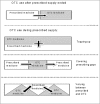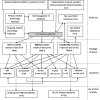'I can't be an addict. I am.' Over-the-counter medicine abuse: a qualitative study
- PMID: 23794565
- PMCID: PMC3693421
- DOI: 10.1136/bmjopen-2013-002913
'I can't be an addict. I am.' Over-the-counter medicine abuse: a qualitative study
Abstract
Objectives: Over-the-counter (OTC) pharmacy medicines are considered relatively safe in contrast to prescribed and illicit substances, but their abuse and addiction potential is increasingly recognised. Those affected represent a hard to reach group, with little known about their experiences. Study objectives were to describe the experiences and views of those self-reporting OTC medicine abuse, and why medicines were taken, how they were obtained and associated treatment and support sought.
Design: Qualitative study using in-depth mainly telephone interviews.
Participants: A purposive sample of 25 adults, aged 20-60s, 13 women.
Setting: UK, via two internet support groups.
Results: Individuals considered themselves 'addicted', but socially and economically active and different from illicit substance misusers. They blamed themselves for losing control over their medicine use, which usually began for genuine medical reasons and not experimentation and was often linked to the cessation of, or ongoing, medical prescribing. Codeine, in compound analgesics, was the main medicine implicated with three distinct dose ranges emerging with decongestant and sedative antihistamine abuse also being reported. Subsequent use was for the 'buzz' or similar effects of the opiate, which was obtained unproblematically by having lists of pharmacies to visit and occasionally using internet suppliers. Perceived withdrawal symptoms were described for all three dose ranges, and work and health problems were reported with higher doses. Mixed views about different treatment and support options emerged with standard drug treatment services being considered inappropriate for OTC medicines and concerns that this 'hidden addiction' was recorded in medical notes. Most supported the continued availability of OTC medicines with appropriate addiction warnings.
Conclusions: Greater awareness of the addiction potential of OTC medicines is needed for the public, pharmacists and medical prescribers, along with appropriate communication about, and reviews of, treatment and support options, for this distinct group.
Keywords: Primary Care; Qualitative Research.
Figures
References
-
- Bissell P, Ward PR, Noyce PR. The dependent consumer: reflections on accounts of the risks of non-prescription medicines. Health 2001;5:5–30
-
- Roumie CL, Griffin MR. Over the counter analgesics in older adults: a call for improved labelling and consumer education. Drugs Aging 2004;21:485–98 - PubMed
-
- Reay G. All-party parliamentary drugs misuse group. An inquiry into physical dependence and addiction to prescription and over-the-counter medication. London: All-Party Parliamentary Drugs Misuse Group, 2009
LinkOut - more resources
Full Text Sources
Other Literature Sources


